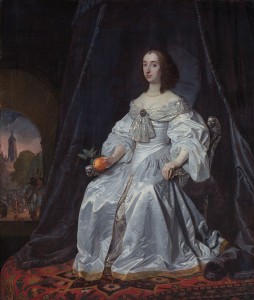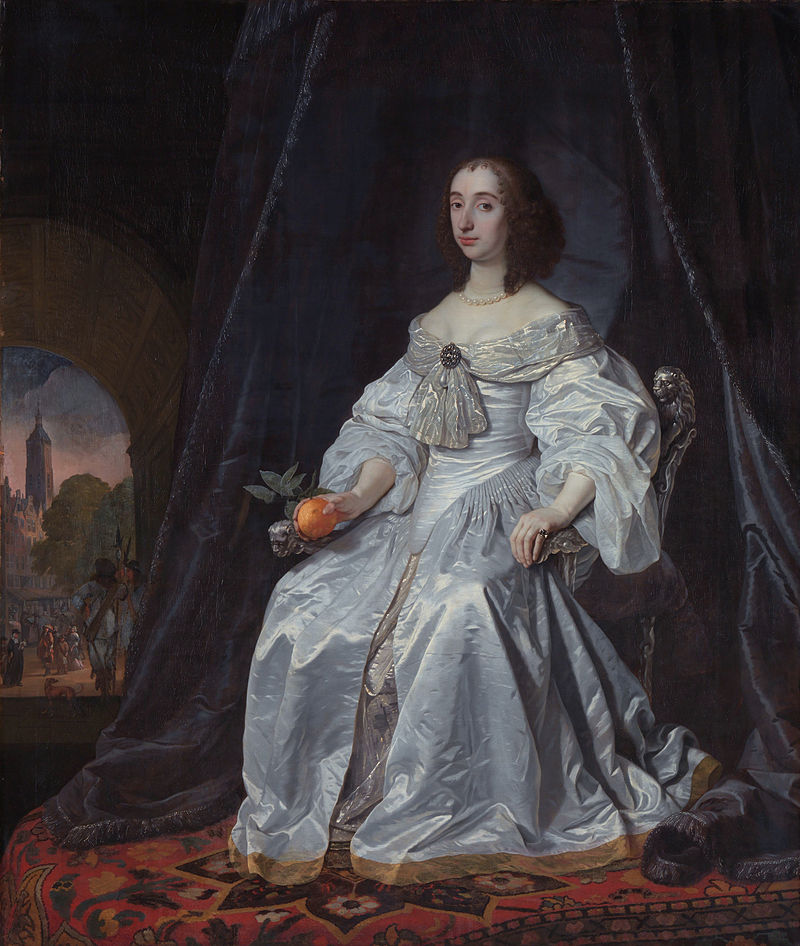By PROFESSOR JAMES DAYBELL
On 23 September 1633, the Constantijn Huygens, the Golden Age Dutch polymath and secretary to two Princes of Orange (Frederick Henry and William II) wrote to Amalia von Solms-Braunfels, wife of the Dutch Stadtholder Frederik Hendrik von Oranje-Nassau (1584–1647) reporting that her husband had given orders for his army to break camp – this was the period of the Thirty Years War (1618-1648).
The letter was one of over 1000 exchanged between Constantijn and Amalia over a long period of time, keeping her abreast of news and political developments. The most striking feature of this particular letter, however, is its size.
Measuring approximately 100mm across it was then carefully folded into a tiny packet of around 20mm in length. It was then small enough to be carefully secreted on the person of the letter-bearer, ensuring that it was not intercepted, thus protecting the highly sensitive information that it contained.
A virtual reconstruction of this tiny spy letter has been completed by Nadine Akkerman (Leiden University) and Jana Dambrogio (MIT Libraries) which demonstrates the intricate art of early modern letter foling and sealing.
This letter to Amalia von Solms forms part of an important body of more than 3500 letters by six wives of the seventeenth-century Dutch and Frisian stadtholders the calenadrs and digital images of which were published online as part of my British Academy/Leverhulme-funded ‘Women’s Early Modern Letters Online’ project.
The correspondence of these six remarkable and incredibly influential political women – Sophia Hedwig von Braunschweig-Wolffenbüttel (1592–1642), Amalia von Solms-Braunfels (1602–1675), Mary Stuart, Princess Royal and Princess of Orange (1631–1661), Albertine Agnes van Oranje-Nassau (1634–1696), Mary II Stuart, Princess of Orange and later Queen of England, Scotland, and Ireland (1662–1694), and Henriette Amalia von Anhalt-Dessau (1666–1726) – represents an important resource for scholars interested in studying the political roles of women during the seventeenth century.
The catalogues were produced as a collaboration between Plymouth and Oxford Universities in the UK, Ineke Huysman at the Huygens ING, Leiden University and the Royal Archives in The Netherlands. A launch event took place at the Royal Palace (Koninklijk Paleis) in Amsterdam in early September sponsored by His Royal Highness King Willem-Alexander.

The correspondence of these six political women is part of a much larger project, ‘Women’s Early Modern Letters Online’, which has been developed by myself and Dr Kim Mclean-Fiander (University of Victoria, Canada), as part of Oxford University’s ‘Early Modern Letters Online’ and ‘Cultures of Knowledge’ projects.
Part of the rationale for the initial conception of WEMLO as a project was the desire to facilitate the study of early modern women’s correspondence, by designing a resource that provided a gateway and community for those scholars (historians and literary critics among others) to access letters by, from and about early modern women across Europe from the period 1400-1800.
Letters represent by far the most ubiquitous form of writing by women from the early modern period, and as complex and sophisticated texts their study broadened our understanding of the multifarious roles women played in politics, religion, science, education, the arts, and other public (not to mention private) spheres in this period.
We felt that even though early modern correspondence projects were flourishing at the time we started, many of them occluded or even excluded letters by women; there was no comprehensive online catalogue to facilitate access to early modern women’s letters by historians, literary critics, gender specialists and linguists.
The overlooking of gender as a search category is of course nothing new, but was largely inherited from previous generations of archivists and cataloguers whose own gender bias is explained by the fact that mainstream historical inquiry generally excluded women, as it did ordinary people; potential source materials were often discarded or destroyed, or where they do survive were either overlooked or considered irrelevant.
Thus, in the 1860s a British Museum archivist cataloguing a volume of ‘letters and papers concerning the disputes between Anthony Bourne and his wife’ described the collection as being ‘of no importance’, although it included numerous letters by Elizabeth Bourne depicting the experiences of an Elizabethan gentlewoman separated from her husband.
Building on Foucault and Derrida’s theorizing about knowledge systems and their underlying archives, historian Randolph Head has recently asserted that the history and development of archives speaks to ‘the exercise of power through knowledge’. Without doubt, archives and those who curate them play a crucial role in not only the maintenance of knowledge but also in its production.
To understand this, one need only look at the ‘Index of Literary Correspondence’, a remarkable card catalogue compiled in three phases between 1927-63 of the Bodleian Library’s extensive holdings of sixteenth-, seventeenth-, and eighteenth-century correspondence. What is striking about them is the way in which they talk about female letter-writers, who represent merely 2% of all correspondents. The cataloguer of the index card abstract for a 1641 letter from Bridget Porter (fl. 1641) to William Lenthall (1591-1662) offers the following comments:
An illiterate appeal on her husband’s and her own behalf. ‘Noble Sir, I beseech you consider the changeableness of this world and whilst you have command and power I may say of the whole Kingdom in your own hands forget not to please my husband, whose heart, zeal and might will be faithfully at your service to the death, whose modesty I fear much wrongs his preferment’. This is a moderate sample of her ranting.
Those familiar with early modern letters will immediately recognize that this is fairly standard petitionary prose for any early modern writer, regardless of gender. Yet this twentieth-century cataloguer felt compelled to refer to this woman’s writing as ‘illiterate’ and ‘ranting’.
Advances in digital technology have indisputably made archives more accessible, and we have seen the development of an increasing number of digital catalogues and finding aids. Nevertheless, online catalogues all too often do not make their content searchable by gender.
This is another instance of how decisions about knowledge management in the archives can impinge on the entire scholarly understanding of a field. If researchers do not easily come across women in online finding aids and databases, they will perpetuate past prejudices and continue to exclude women from history.
As a matter of urgency, scholars need to campaign with project leaders, archivists, librarians, and software developers (a field in which women are a stark minority) first to employ someone to identify which historical documents were produced by women and then to build in the capacity to search databases by gender.
In terms of records relating to women, in addition to the wonderful collection of letters Stadholders’ wives letters, WEMLO includes the roughly 3% of Bodleian card index that is comprised of letters to or from women, in addition to a foundational dataset of letter records for the period 1540-1603 collected by myself from archives around the world and carefully curated into collections by Kim McLean-Fiander, with individual entries on women such as Arbella Stuart, Lady Penelope Rich, Margaret Clifford, Anne Bacon,and Anne Dudley, countess of Warwick.
This carefully curated dataset will be joined by data on Bess of Hardwick, Elizabeth of Bohemia, Quaker women, Yorkist and Early Tudor Women as well as the women who corresponded with Constantijn Huygens and William of Orange.
In collaborating with and being incorporated in EMLO, Women’s Early Modern Letters Online has been able to introduce new features of searchability for its particular community of researchers, which includes the ability to search purely by gender, and to access letters that were penned by, sent to or even merely mention women of the period, and this for us is what is so exciting about the accession of this collection of letters by Stadholders’ wives, which adds a substantial and rich corpus of material for integration within EMLO.
The resource also offers various analytical tools that are able to enhance the research experience, from detailed biographical notes and landing pages for each project, to prosopgraphical, visualization and network analysis tools that will open up collections like the Stadholders’ wives letters for new and rigorous analysis. What is more, the material is all open access, so there is no excuse not to study and reconstruct the lives of these important early modern women!
James Daybell is Director of the Arts Institute and Professor of Early Modern British History at Plymouth University, and a Fellow of the Royal Historical Society. He is co-director of ‘Women’s Early Modern Letters Online’, and author of many books and articles on early modern social and cultural history, gender, politics and letter-writing. Recent publications include Cultures of Correspondence in Early Modern Britain (U Penn, Material Texts series); Gender and Political Culture in Early Modern Europe, 1400-1800 (Routledge, Women and Gender in the Early Modern World) and Women and Epistolary Agency in Early Modern Culture, 1450-1690.


